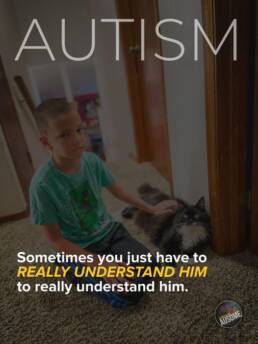When Jonah was diagnosed with autism at age 3 in 2016, he was completely nonverbal.
Literally.
He would hand-lead to indicate what he wanted. He would “throw” my hand at things that were out of reach, instead of pointing at them.
The concept of a “sound” made with vocal cords shaped by a tongue and lips to represent a real actual “idea” was completely foreign to him.
Think about it.
This is why “speech delay” is one of the early indicators of autism.
“Spoken language” is an abstract construct and hard to process for a literal thinker.
Take “pointing” as another example.
“Pointing” at a desired object is also an abstract construct that we use everyday.
The idea that we can use an index finger to indicate “I want” requires a mutual understanding that physically “touching” the object is not required.
An alternative solution to convey “I want” would be to just “try to get it.” (Behavior)
Climbing on things to reach it. Throwing Daddy’s hand at it (as a tool to retrieve it).
Practical solutions.
Literal solutions.
Jonah has developed a lot since his diagnosis 7 years ago. He will now follow a point and point to things he wants. He can speak and use words to convey his wants and needs.
So why do I still introduce Jonah as “mostly-nonverbal?”
There are a few reasons.
The first reason is that despite being able to imitate most speaking skills, Jonah still has a tough time expressing his exact intentions. And when he doesn’t have the exact words to convey what he is feeling, he will choose to not say anything at all. He’s sort of a perfectionist that way.
The second reason is social anxiety. Jonah is actually self-conscious about his speaking abilities so he is only willing to verbally communicate with people he implicitly trusts. Many times, even with trusted listeners, he will mutter under his breath, too low for anyone to hear.
He won’t even engage with people he doesn’t know, much less talk to them.
The third reason is that even with trusted people, many times it takes an interpreter to translate Jonah’s “speech patterns.”
For instance, not many people would correctly decipher Jonah saying “All done go home!”
“All done” is a transition phrase we originally used to indicate Jonah being “all done” with an activity but has since evolved to also mean “I don’t want…”
So “all done ‘food’” either means “I’m done with food” if there is food in front of him, or “I don’t want any food” if there is not.
“All done ‘cough’” means “I don’t want coughing.” (Stop coughing)
“All done ‘Daddy behind’” means “I don’t want Daddy behind me,” (“Daddy, don’t chase me.”)
With that in mind…
“All done ‘go home’” would mean…
“I don’t want to go home” or “I’m ‘all done’ with your idea of ‘going home.’”
Most would translate it as Jonah saying “I’m all done. It’s time to go home.”
But it’s actually the exact opposite for Jonah, and that is a HUGE misinterpretation.
That’s why I still introduce Jonah as “mostly nonverbal.”
When it comes to Jonah and speech, sometimes you just have to REALLY UNDERSTAND HIM, to really understand him.
#ausome #autism #nonverbal #AutismDad #autismmom #severeautism
